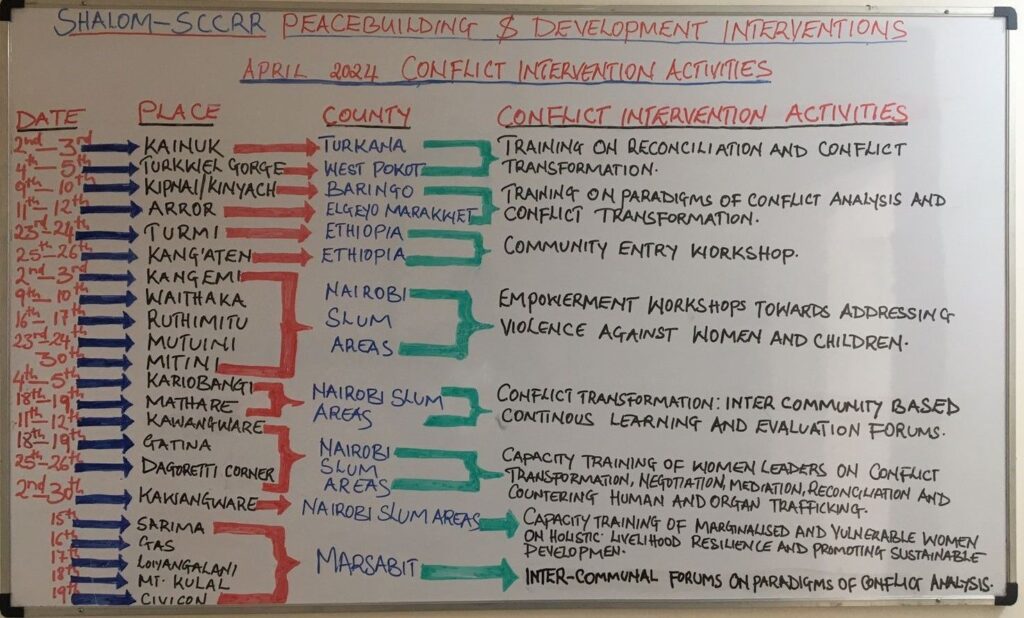By Paulson Erot Tadeo
The Ilemi Triangle is the area approximately 11, 000 kilometers2 in triangular radius in three directions from where Kenya, Ethiopia and South Sudan borders meet. The Triangle and its environs that include the Lower Omo Valley have a very long and prominent standing in the global historiography of Eastern Africa. Which of the three countries own the Triangle remains contentious.

Participants role play a dispute where two husbands have to halt a conflict between their wives.
Since the Triangle was the first to receive modern arms among African hands, it formed the ‘cradle of rush’ for arms in the region, and experienced the earliest violent skirmishes. Even then, they were on smaller scale not comparable to what has been occurring since the 1990s with modern globalization. Therefore, militarization has led to the amassing of arms by ethnic groups living in the Triangle for survival. The more sophisticated arms a group acquires, the more dominant it becomes. Thus, the dominance of certain pastoralist groups in the Triangle measured by possession of livestock, and creation of grazing areas and access to watering points has a direct correlation to the availability of sophisticated arms compared to its neighbours.
The Ilemi Triangle has, therefore, witnessed persistent violent inter-ethnic conflicts among ethnic groups living there; the Turkana (of Kenya), the Toposa (of South Sudan), the Nyang’atom and the Merille (of Ethiopia). These conflicts majorly emanate from scarcity of vital resources (water and pasture), revenge and the desire to capture more livestock, which constitutes the lifeline of these pastoralist communities.
The quest to manage, resolve and transform the persistence of these violent conflicts formed the basis for the Shalom’s intervention in this area. Shalom, therefore, mapped-out the conflict-prone areas in the Ilemi Triangle which include Kibish, Kokuro, Koyasa, Lokamarinyang’ and Napak in Turkana County. As from 2013, Shalom engaged in equipping key stakeholders – the Assistant County Commissioners, the chiefs, assistant chiefs, Kenya Police, GSUs, APs, Police Reservist, religious leaders, village elders, kraal leaders, youth leaders (warriors/morans) and women leaders – in these areas with analytical skills and peace techniques through intensive training so that they can be able to manage, resolve and transform their own conflicts at the grassroots level (bottom-up approach).
 From the 23rd to the 28th of May, 2016, SCCRR held a Mediation workshop in Kibish and Kokuro. Shalom was requested to train the community on Alternative Dispute Resolution (ADR) because it can allow communities to resolve their own conflicts and arrive at concrete and effective settlements. The participants were able to learn the role of a mediator so that they too could apply these skills in their daily life. They also learned the benefits of mediation which include confidentiality, saves on costs, high compliance and that solutions come from the disputing parties. Therefore communities are able to learn the process of owning their own resolution process.
From the 23rd to the 28th of May, 2016, SCCRR held a Mediation workshop in Kibish and Kokuro. Shalom was requested to train the community on Alternative Dispute Resolution (ADR) because it can allow communities to resolve their own conflicts and arrive at concrete and effective settlements. The participants were able to learn the role of a mediator so that they too could apply these skills in their daily life. They also learned the benefits of mediation which include confidentiality, saves on costs, high compliance and that solutions come from the disputing parties. Therefore communities are able to learn the process of owning their own resolution process.
This workshop was particularly promising because SCCRR was able to train the Turkana and the Nyang’atom together; two communities that have in the recent past engaged in violent conflict. The interaction between the two groups was genuine illustrated in their group discussions, and sharing of experiences. The participants, who speak the same language, were very grateful for the work of SCCRR in what they term as the ‘forgotten world’. “We are not used to people taking time to come and share vital knowledge with us. Please do not give up on us as we too will not give up on ourselves”, said a very emotional Chief Kotol Lokuto Kibish. This emphasizes not only the appreciation from the communities living in remote areas but also the need to continue sowing seeds of durable and sustainable peace.

